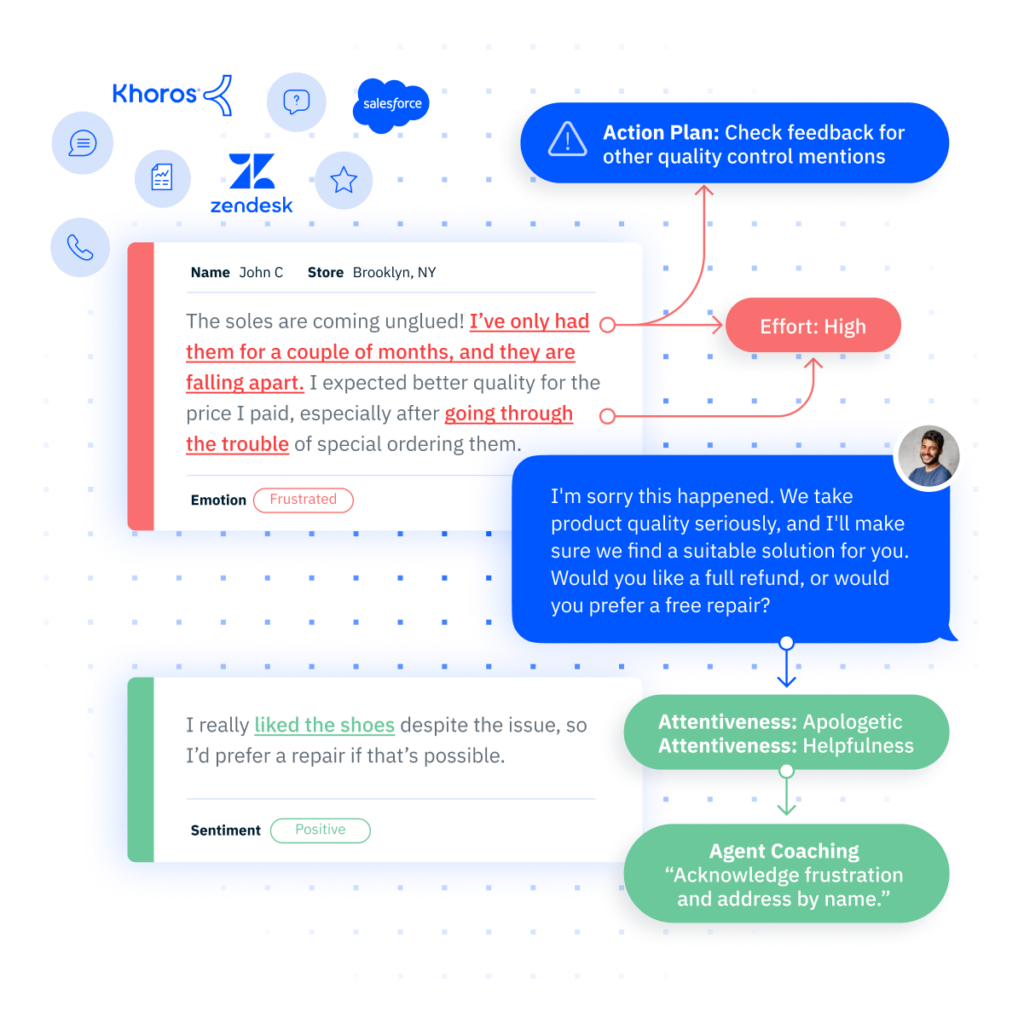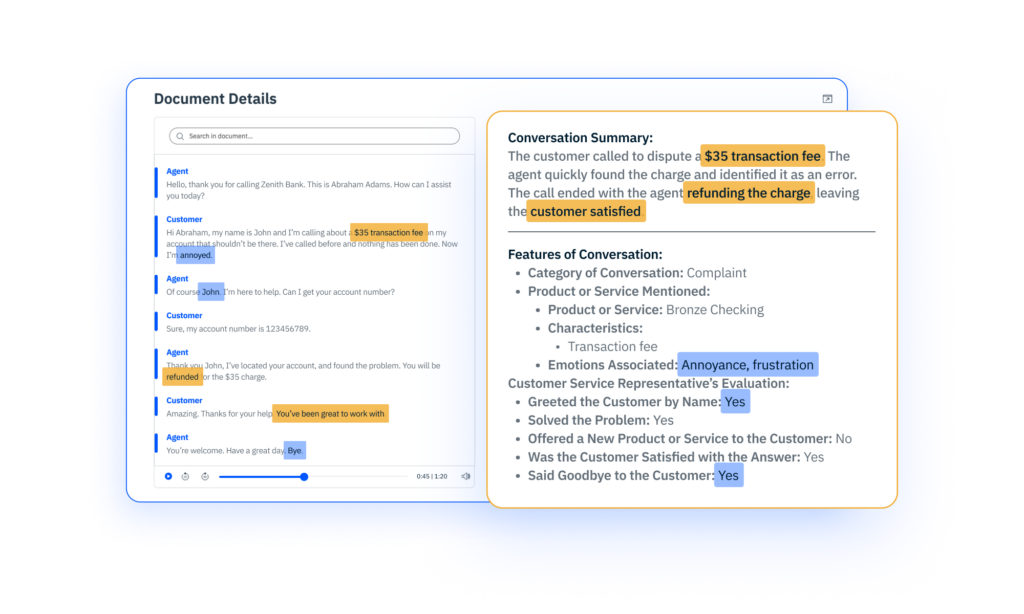The advent of conversational intelligence has become a catalyst for transformation in the way that businesses communicate with consumers. More than just a technological innovation, conversational intelligence represents a paradigm shift how organizations understand, interpret, and harness the power of human conversations.
What is Conversation Intelligence
Conversation intelligence refers to the ability to understand, analyze, and optimize human conversations, particularly in the context of business interactions. It involves leveraging software such as natural language processing (NLP), machine learning, and artificial intelligence to gain insights from spoken or written conversations. The goal of conversation intelligence is to enhance communication, improve collaboration, and extract valuable information from interactions.
Why is Conversational Intelligence Important?
One of the primary reasons conversation intelligence is crucial lies in its ability to enhance the customer experience. By deciphering the nuances of customer interactions, businesses can gain valuable insights into preferences, sentiments, and pain points. This information, in turn, empowers companies to tailor their products, services, and communication strategies to meet the evolving needs of their customer base.

Conversation intelligence also provides a data-driven foundation for decision-making. Analyzing conversations allows businesses to identify trends, evaluate employee performance, and make informed decisions that align with organizational goals. This data-driven approach fosters agility and adaptability, which is crucial in today’s fast-paced business environment.
How Does Conversation Intelligence Work?
Conversation intelligence works through the integration of advanced software, primarily natural language processing (NLP), machine learning (ML), and artificial intelligence (AI). Here is a breakdown of how conversation intelligence operates:
- Data Collection: Conversation intelligence platforms can work as part of an omnichannel contact center to gather data from various sources, including audio recordings of phone calls, video conferences, chat transcripts, emails, and other written communication channels.
- Preprocessing: Raw data often contains noise, irrelevant information, or inconsistencies. Preprocessing involves cleaning and organizing the data to ensure accuracy and reliability.
- Audio Transcription: Audio data is typically transcribed into text using speech-to-text technology. This step is crucial for analyzing spoken conversations.
- Understanding Language: NLP algorithms are employed to understand the structure and meaning of human language. This involves tasks such as tokenization (breaking text into words), syntactic analysis (parsing sentence structure), and semantic analysis (interpreting meaning).
- Analytics and Reporting: Conversation intelligence platforms can aid in contact center analytics and reporting features that summarize key metrics, trends, and insights derived from the analyzed conversations. This information is valuable for making data-driven decisions and optimizing business processes.
In essence, conversation intelligence involves a multi-step process of data collection, preprocessing, language understanding, sentiment analysis, machine learning, and real-time analytics. It leverages advanced technologies to extract meaningful insights from conversations, providing businesses with the tools to enhance customer experiences, improve communication strategies, and make informed decisions.
What’s the Difference Between Conversation Intelligence vs Call Tracking Software?
While conversation intelligence and call tracking software both deal with analyzing interactions, they serve different purposes. Call tracking software primarily focuses on monitoring and analyzing call metrics, such as call duration, source, and outcome. On the other hand, conversation intelligence encompasses a broader spectrum that includes the analysis of both spoken and written interactions. It incorporates advanced features such as sentiment analysis, data extraction, and real-time analytics to provide a comprehensive understanding of communication across various channels.
Benefits of Conversational Intelligence
The adoption of conversational intelligence has become a strategic imperative for businesses aiming to stay ahead in the digital era. This transformative technology not only revolutionizes the way organizations understand customer interactions but also brings forth a host of tangible benefits. From optimizing call center performance and nurturing agents to deriving valuable insights and enhancing productivity, conversational intelligence is reshaping the dynamics of customer service. Here is a deeper look into some of the benefits of conversational intelligence.
1. Optimizing Call Center Performance
Conversational intelligence proves to be a game-changer for call centers by providing real-time insights into customer interactions. Monitoring and analyzing calls help identify areas for improvement, ensuring that customer service representatives deliver a consistent and high-quality experience. This optimization leads to increased customer satisfaction and loyalty.
2. Agent Nurturing and Training
Conversational intelligence serves as a powerful tool for nurturing and training customer service agents. These platforms offer customer experience metrics such as response times, call resolution rates, customer satisfaction scores, and agent performance indicators. By analyzing successful interactions, managers can identify best practices and provide targeted coaching to enhance the skills of their teams. This fosters continuous improvement, boosts agent confidence, and contributes to a more positive and proficient workforce.
3. Extracting Valuable Insights
Extracting valuable insights from customer conversations is a key benefit of conversational intelligence. The platform’s ability to perform sentiment analysis, entity recognition, and data extraction enables businesses to understand customer preferences, pain points, and emerging trends. These insights are invaluable for making informed business decisions, refining strategies, and staying ahead in a competitive market.
InMoment’s XI Platform utilizes AI technology to generate auto-generated conversation summaries. These insights give users access to conversation themes, product or service mentions, and can also help track agent performance. This feature has been shown to reduce the average handle time (AHT) by up to 33%.

4. Personalized Customer Interactions
By understanding the nuances of conversations, conversational intelligence enables businesses to personalize customer interactions. This personalization goes beyond addressing customers by name; it involves tailoring responses based on historical interactions, preferences, and previous purchase behavior. The result is a more engaging and customer-centric experience that fosters brand loyalty.
5. Efficient Resource Allocation
Understanding the dynamics of customer conversations helps businesses allocate resources more efficiently. By identifying peak hours, common customer queries, and areas of high demand, organizations can optimize staffing levels, ensuring that they have the right resources in place to handle customer interactions effectively.
Conversation Intelligence Examples
When examining conversation intelligence, it becomes evident that the impact of this transformative technology extends across various industries by reshaping communication dynamics and optimizing operational processes. Let’s look at a few industry-specific examples.
1. Healthcare: Optimizing Patient Interactions
In the healthcare industry, conversational intelligence proves to be invaluable for optimizing patient interactions. By analyzing conversations between healthcare professionals and patients, organizations can enhance communication effectiveness. This includes understanding patient concerns, improving appointment scheduling processes, and ensuring compliance with healthcare regulations. The insights derived contribute to a more patient-centric approach, fostering improved healthcare outcomes and patient satisfaction.
2. E-Commerce: Enhancing Customer Support and Sales
In the e-commerce sector, conversation intelligence plays a crucial role in enhancing customer support and driving sales. By analyzing customer interactions across various channels, such as live chat, emails, and phone calls, businesses gain insights into customer preferences, product feedback, and common pain points. This information is instrumental in tailoring marketing strategies, improving the online shopping experience, and providing personalized recommendations, ultimately boosting customer satisfaction and loyalty.
3. Financial Services: Ensuring Regulatory Compliance
In the highly regulated financial services industry, conversation intelligence is essential for ensuring regulatory compliance. By analyzing conversations in customer interactions, financial institutions can monitor and enforce adherence to compliance standards and legal requirements. This proactive approach helps mitigate risks, avoid regulatory penalties, and maintain the integrity of financial operations.
These industry-specific examples showcase the targeted application of conversation intelligence, demonstrating its ability to address unique challenges and opportunities within different sectors. Whether it’s optimizing patient care in healthcare, enhancing customer support in e-commerce, or ensuring regulatory compliance in financial services, conversation intelligence proves to be a versatile tool with applications tailored to industry-specific needs.
Conversation Intelligence with InMoment
The adoption of conversational intelligence, powered by advanced technologies like natural language processing and machine learning, is not merely a strategic choice but a necessity in the contemporary business landscape. InMoment’s conversation intelligence technology empowers organizations to navigate the intricacies of conversations and turn insights into actions, and ultimately drive business success. Schedule a demo to learn more today!



